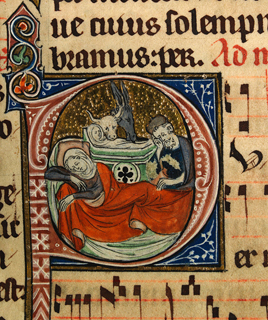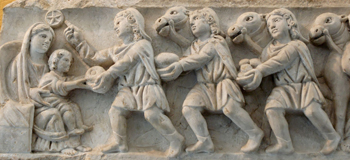If you grew up in church like I did, maybe like me you especially enjoy singing one of the oldest and beloved of all Christmas songs — "Of the Father's Love Begotten." The hymn originated as a Latin poem by Aurelius Prudentius Clemens (348–c.413), which was paired with a plainsong melody by the 10th century.
Early Christianity flourished among people in the lower socio-economic classes. Very few, says Paul, were wealthy, influential, or of noble birth. The critic Celsus (fl.175) thus sneered, "In some private homes we find people who work with wool and rags, and cobblers, that is, the least cultured and most ignorant kind."
 |
|
The Nativity, English liturgical manuscript, c.1310-1320.
|
Prudentius exemplifies the radical sea change that occurred in the relationship between Christianity and culture in the next 150 years. Born to an upper class family in one of the Roman provinces of what is now northern Spain, he was a lawyer and/or judge, and then a two term provincial governor. The Roman emperor Theodosius I then summoned him to serve in his administration in Rome. Prudentius combined a vibrant Christian faith, a commitment to classical culture, and Roman patriotism.
When he was fifty-seven, Prudentius repudiated his public life of government service. He says that he became an ascetic, fasted until evening, and abstained from all animal food.
"Now, the, at last, close on the very end of life,
May yet my sinful soul put off her foolishness;
And if by deeds it cannot, yet, at least, by words give praise to God,
Join day to day by constant hymns,
Fail not each night in songs to celebrate the Lord,
Fight against heresies, maintain the Catholic faith."
At this later stage in his life, Prudentius had no money to help the poor. What he did have to offer God, he said, was his poetry. Prudentius eventually collected his Latin poems into a book, wrote an autobiographical preface, and himself dated the work to 405. In so doing, he became Christianity's earliest poet.
O that birth forever blessed!
Of the Father’s love begotten, ere the worlds began to be,
He is Alpha and Omega, He the source, the ending He,
Of the things that are, that have been,
And that future years shall see, evermore and evermore!At His Word the worlds were framèd; He commanded; it was done:
Heaven and earth and depths of ocean in their threefold order one;
All that grows beneath the shining
Of the moon and burning sun, evermore and evermore!He is found in human fashion, death and sorrow here to know,
That the race of Adam’s children doomed by law to endless woe,
May not henceforth die and perish
In the dreadful gulf below, evermore and evermore!O that birth forever blessèd, when the virgin, full of grace,
By the Holy Ghost conceiving, bare the Savior of our race;
And the Babe, the world’s Redeemer,
First revealed His sacred face, evermore and evermore!This is He Whom seers in old time chanted of with one accord;
Whom the voices of the prophets promised in their faithful word;
Now He shines, the long expected,
Let creation praise its Lord, evermore and evermore!
O ye heights of heaven adore Him; angel hosts, His praises sing;
Powers, dominions, bow before Him, and extol our God and King!
Let no tongue on earth be silent,
Every voice in concert sing, evermore and evermore!Righteous judge of souls departed, righteous King of them that live,
On the Father’s throne exalted none in might with Thee may strive;
Who at last in vengeance coming
Sinners from Thy face shalt drive, evermore and evermore!Thee let old men, thee let young men, thee let boys in chorus sing;
Matrons, virgins, little maidens, with glad voices answering:
Let their guileless songs re-echo,
And the heart its music bring, evermore and evermore!Christ, to Thee with God the Father, and, O Holy Ghost, to Thee,
Hymn and chant with high thanksgiving, and unwearied praises be:
Honor, glory, and dominion,
And eternal victory, evermore and evermore!
Image credits: (1) Wikipedia.org and (2) Wikipedia.org.




